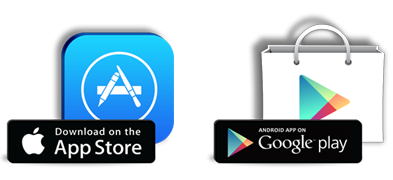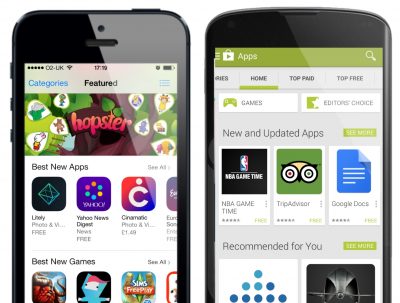Currently there are over 2 million iOS apps, 3 million Android apps and 600K Amazon Apps and the numbers continue to rise. For many businesses that me...
Currently there are over 2 million iOS apps, 3 million Android apps and 600K Amazon Apps and the numbers continue to rise. For many businesses that means that launching a mobile app is extremely important for competition. But, there are also 8+ million app developers across the world.
Now, you can learn to code and build your own app, but time is money and you need to focus on running your business. So, hiring app developers is probably the best option.
However, this is where the challenge of finding the right development team for the right price comes in. Especially when the estimated cost of app development can range from $50,000 up to $500,000 and some even hitting the $1 million mark.
App development then becomes a substantial business investment. Therefore, you need to make sure that you get your money’s worth and save yourself from future headaches by choosing the right app developers.
So here are the 12 key questions you should ask your potential app developers.
1. Can I see your portfolio of built apps?
Whether you request for a portfolio or not, every developer should have a list of apps they’ve developed previously. Of course, excluding the ones that signed a Non Disclosure Agreement (NDA).
Aside from asking them what apps they’ve developed you can also download and test those apps and check their reviews. Even though experience is of high value, if they don’t have any developed apps yet, they still might be able to build yours. Just know that there’s no substitute for actual experience.
2. Do you have any mobile app client case studies? If not, may I speak to any of your previous clients?
Other than a portfolio you can ask the developer to provide you with information about their current or previous clients. That can entail testimonials, case studies or actually speaking to them directly.
Some questions you can ask them are:
- Did they actually develop your app?
- Are they reliable?
- How well do they communicate?
- How did they handle the relationship in times of pressure?
- Did they meet deadlines?
Case studies and testimonials are also a great way to learn more about the developer. Case studies usually include how an app generated a high ROI and delivered results such as great reviews and downloads. Testimonials are less specific, but they do show how other clients feel about the developer and their work.
Overall, their clients can give you insight on how the developer worked with them and provide feedback as well.
3. How well do you understand my project, business and customers?
If a developer has worked with clients in your industry, then you can feel confident that they know your industry. Or at least enough about it to build an app. But in the case that you’re not sure if they understand your business, customers and overall market go ahead and ask them.
A developer needs to understand your target market and your business in order to design a relevant app. Considering that your customer’s needs and wants ultimately guide your app’s features and visual design.
If the developer doesn’t understand these aspects, but is willing to learn about them then that is a positive step forward. However, if they don’t wish to try to learn or see the importance of knowing such things then reconsider working with them.
4. What is your development process like? Do you use the Agile methodology?
Knowing how a developer works to build your app is critical. Their development process needs to be the quickest possible yet still effective. By going through their development process you can figure out how fast they work, how they deal with setbacks, what milestones to look out for, do they use sprints and so on.
Also, ask them is they use the Agile methodology since it offers certain benefits that other methods like Waterfall don’t; such as:
- Reduced time to market
- Reduced development costs
- Integrated testing into the development process
- Reduced maintenance and support costs
Read Also: Agile vs Waterfall Development
5. How will my project be managed? Who will be involved?
Project management goes hand in hand with the development process, but it focuses more on the Who rather than the How. Who will be the Project manager? Who will develop the app? Will there be multiple developers? Who else will be involved?
Typically, our client’s gain access to a team consisting of
- One Dedicated Project Manager
- One Systems Analyst
- One Business Analyst
- One Designer
- One Developer
- One Technical Consultant
- One Network Engineer
- One Software Tester
- One Technical Support Center
That’s a lot of people that make up your project’s team. Some development agencies may offer more or less so it is important to know who will be working on your app. The size of the team and their overall expertise must justify the quality of work delivered and the amount of time spent on the project.
Also, don’t forget to ask who will be the main person to contact throughout the entire process. Most companies assign a single project manager but that can differ so be sure to ask.
6. How will we communicate?
Once you know who will be your day to day point person ask how you will communicate with them. Having strong and consistent communication throughout the development process is crucial for your project.
Although E-mails, phone calls and texts are good for simple communication usually app developers use project-management tools like Asana, Trello or Jira. Some developers might even have their own project management tools like Iblesoft does with MyOpenConnect.
A project management tool like MyOpenConnect can help you track your app’s progress in real-time, communicate with your team and process payments.
Aside from communication tools you should set up weekly or bi-weekly meetings with the developers to discuss status updates and identify any issues. These meetings allow you to see if your developer’s availability works with yours.
If the app developers work remotely or on different time zones then that could affect your communication. Asking this question will further prove if they are the right fit for your business or not.
7. How experienced are your app developers?
This question is pretty simple. If the app developers have experience, that’s great. If they have certifications even better. However, don’t get discouraged if the development agency doesn’t have any prior experience with mobile apps just yet. (This goes back to question 1)
App development skills are valuable, but if the agency can tell you how they can build the features and functionalities that you need in your app then keep asking questions. Ask if they have ideas on useful plugins and frameworks or provide them with some apps that are similar to the one you want and ask how they would improve it.
8. What are your fees and payment terms?
Before you agree with pricing you will want to have a clear and flexible budget for your project. Once you do, you will want to know how much the entire project will cost. Then, to ensure you’re both protected a Statement of Work (SOW) is made with the project scope. This document includes a defined set of deliverables as well as payment fees and terms. Review this document carefully in order to make sure that both of you agree on everything.
Read Also: How Much Does It Cost to Make a Mobile App?
Developers mainly use one of these two pricing structures – hourly and fixed.
- Hourly pricing charge – developer charges a rate for each hour worked on developing your app
- Hourly pricing payment – bi-weekly or monthly
- Fixed pricing charge – developer determines a total cost of the project upfront
- Fixed pricing payment – can vary from a 30-50% deposit with the rest due after delivery or total payment upon completion
Regardless of the payment structure if any additional costs emerge, the developer should inform you about it. You should also discuss how much they charge for any additional work before approving it.
Look out for developers that ask for complete payment upfront because they can rip you off. You need to have a legitimate payment structure to ensure the work is done right and actually completed.
9. How much do you emphasize design, UX and testing during development?
Ask yourself this question: Would you rather have thousands of app downloads with low retention rates or fewer downloads but high retention rates?
Downloads are an important success metric, but not if people aren’t keeping your app. You want an app with a great design equipped with a great user experience as well.
Without a great User Interface and User Experience, your app will not succeed. The right app developer must incorporate both parts of a good mobile app – user interface and user experience in order for it to be successful.
Check out the UI vs UX Guide
Even with great UI and UX an app can still have bugs and errors. You must work with your app developers to ensure that your app not only works but works well.
Testing should occur throughout the entire development process to avoid mistakes at every stage. (This is another perk of the Agile methodology, as previously mentioned)
In addition to testing throughout development and testing tools you can also give beta tests to potential users. This way you can get feedback from actual future users before you launch the app.
Some app developers may emphasize these points more than others or have their own methods of testing so make sure you agree with them on this.
10. Will you submit my mobile app to app stores?
Once you are ready to launch your app you have to go through a tedious app store submission process. Especially when submitting an iOS app into the Apple store. Ask your developer if they will do this process for you and if not then if they could at least help you through it.
An experienced app developer will know how to best guide you through this process as quickly and painlessly as possible. However, just because they are doing the submission process doesn’t mean that you should let them do it alone.
It is highly recommended that you get your own Apple Developer Program subscription and Google Play developer account if you’re submitting to both stores or any other account for other app stores you’re submitting the app to.

If the app developer submits your app under their name then you will not have access to your app because the app stores won’t know that it’s actually your own app. Without access you won’t be able to make any updates or release new versions of the app without the developer.
In order to gain control of your app again you’d have to build a new one from scratch and submit it under a different account. That would be a huge waste of money and time.
Therefore, if the developer can help you through the submission process be clear that it will all be submitted under your own accounts.
11. Do you offer app maintenance post-launch and who owns the code?
Okay so you launched the app and submitted to every store with your account. You don’t need a developer any more right? Not quite.
In order to acquire and retain app users you’ll have keep up with bug fixes, test on updated versions of the operating systems and continuously release new app updates.
Basically, your mobile app will need constant support and maintenance. For this reason, it’s very important to ask your developer what app support and maintenance packages they offer.
Read also: What goes into Mobile App Maintenance
Aside from asking about maintenance be sure to ask who owns the code. The right answer should always be the client, considering you are paying for it all. However some development companies deny giving you full proprietorship of the code their developers wrote.
Don’t let these companies trick you into believing that that’s right because third party software development is created under a “Work Made for Hire” copyright that makes the purchaser of services (you), the owner of the app’s designs and code. So make sure the language in your contract reflects this.
12. What do you need from me before and during development?
Most of the time clients provide a project’s content including images, videos or text. However, if you don’t wish to provide it then ask if the development company can provide it for you.
This is only a small aspect of what you might need to provide before and during the development process. Make a list of requirements that each developer you’re considering working with would need from you.
Regardless of what the lists look like just know that every every app developer will need your involvement throughout the entire process. After all, your app’s wireframes, prototypes, design and overall product can’t be completed without your input.
Conclusion
Finding the right Mobile App Developers is important, but it’s not easy. So take the time to ask them these important questions to make sure that the ones you find are the best fit for your business.







COMMENTS